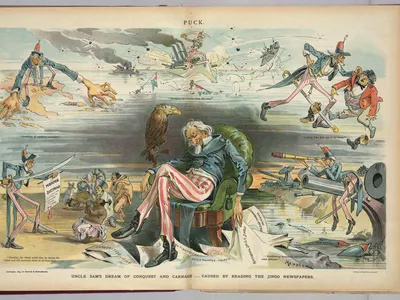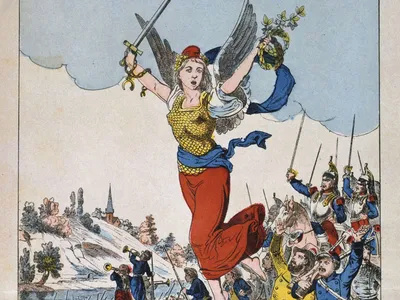Jingoism for what it's not worth
CIVILISATION: Development of Society :: THE DEVELOPMENT OF CIVILISATION :: SATIRE: A Comedy of Errors or an Error of Comedy
Page 1 of 1
 Jingoism for what it's not worth
Jingoism for what it's not worth
On the subject of 'isms' .... jingoism is not new but an 'ism' it is so has it's rightful place in ism'sphere.
The military two step, a traditional Scottish dance performed at ceilidhs and parties up and down the country, it could be likened to a good old fashioned British knees-up or the true military march - left right left right left right. Turn that into a light jingleism in the mind as you march and it relieves the monotony.
But jingoism is a serious matter in it's own right, especially for the wearer who fails to understand how the history of mankind (yes that is a real acceptable word - even in the 21st Century) shapes what we all are today, a cocktail of mixed heritage.
What right does the jingoist think they have to claim patriotic ownership of something that doesn't belong to them? No matter what the species on earth we all belong to nature, we are born through procreation of some sort, we live and then we die. Any variation of the basic principles of life on earth is man-made - that basic applies to assumed ownership but of course that is nothing new, humans throughout the ages have fought for possession of that which they have no rights under the laws of nature - planet earths only true laws.
WOW !!! How dare they !!! I hear you splutter.
Human beings are all outlaws with their own self righteous guidelines that can only lead to eternal perdition.
A brief history..
The military two step, a traditional Scottish dance performed at ceilidhs and parties up and down the country, it could be likened to a good old fashioned British knees-up or the true military march - left right left right left right. Turn that into a light jingleism in the mind as you march and it relieves the monotony.
But jingoism is a serious matter in it's own right, especially for the wearer who fails to understand how the history of mankind (yes that is a real acceptable word - even in the 21st Century) shapes what we all are today, a cocktail of mixed heritage.
What right does the jingoist think they have to claim patriotic ownership of something that doesn't belong to them? No matter what the species on earth we all belong to nature, we are born through procreation of some sort, we live and then we die. Any variation of the basic principles of life on earth is man-made - that basic applies to assumed ownership but of course that is nothing new, humans throughout the ages have fought for possession of that which they have no rights under the laws of nature - planet earths only true laws.
WOW !!! How dare they !!! I hear you splutter.
Human beings are all outlaws with their own self righteous guidelines that can only lead to eternal perdition.
A brief history..
 A Brief History of Jingoism
A Brief History of Jingoism
Jingoism
nationalism

Jingoism, an attitude of belligerent nationalism, or a blind adherence to the rightness or virtue of one’s own nation, society, or group, simply because it is one’s own. The term is the approximate equivalent of chauvinism (in one of its meanings), originally a French word (chauvinisme) denoting excessive or irrational patriotism. The term apparently originated in England during the Russo-Turkish War of 1877–78, when the British Mediterranean squadron was sent to Gallipoli to restrain Russia and war fever was aroused. Supporters of the British government’s policy toward Russia came to be called jingoes as a result of the phrase “by jingo,” which appeared in the refrain of a popular song:
We don’t want to fight, yet by jingo, if we do,
We’ve got the ships, we’ve got the men,
And got the money, too!
Patriotism

patriotism, feeling of attachment and commitment to a country, nation, or political community. Patriotism (love of country) and nationalism (loyalty to one’s nation) are often taken to be synonymous, yet patriotism has its origins some 2,000 years prior to the rise of nationalism in the 19th century.
Greek and especially Roman antiquity provide the roots for a political patriotism that conceives of loyalty to the patria as loyalty to a political conception of the republic. It is associated with the love of law and common liberty, the search for the common good, and the duty to behave justly toward one’s country. This classical Roman meaning of patria reemerges in the context of the Italian city republics of the 15th century. Here, patria stands for the common liberty of the city, which can only be safeguarded by the citizens’ civic spirit. For Niccolò Machiavelli, the love of common liberty enabled citizens to see their private and particular interests as part of the common good and helped them to resist corruption and tyranny. While this love of the city is typically intermixed with pride in its military strength and cultural superiority, it is the political institutions and way of life of the city that form the distinctive focal point of this kind of patriotic attachment. To love the city is to be willing to sacrifice one’s own good—including one’s life—for the protection of common liberty.
In contrast to the classical republican conception of patriotism, Jean-Jacques Rousseau’s Considerations on the Government of Poland can be seen as an early example of the link between nationalism and patriotism. While Rousseau advocated the love of the nation and the celebration of national culture, he believed that national culture is valuable primarily because it helps foster loyalty to the political fatherland. Thus, Rousseau’s nationalism stemmed from and served his typically republican emphasis on securing citizens’ loyalty to their political institutions.
A more explicit link between nationalism and patriotism can be found in the work of German philosopher Johann Gottfried von Herder. In Herder’s view, patriotism refers not to a political virtue but to a spiritual attachment to the nation. In this context, fatherland becomes synonymous with the nation and its distinct language and culture, which give it unity and coherence. Thus, instead of linking patriotism to the preservation of political liberty, Herder associates love of one’s country with the preservation of a common culture and the spiritual unity of a people. While in the classical republican tradition, “fatherland” is synonymous with political institutions, for Herder, the nation is prepolitical and love of one’s national culture is a natural inclination that allows a people to express their distinctive character. On this account, patriotism is associated with the exclusive attachment to one’s own culture and thus stands in opposition to cosmopolitanism and cultural assimilation. Freedom is equated not with the fight against political oppression but with the preservation of a unique people and patriotic sacrifice with the desire to secure the long-term survival of the nation.
This association between patriotism and the exclusive attachment to one’s nation has led critics to view the sentiment of patriotic pride as morally dangerous, giving rise to a chauvinism that is incompatible with cosmopolitan aspirations and the recognition of the equal moral worth of all human beings. More sympathetic approaches to patriotism have sought to ground it in new forms of loyalty that are compatible with universal values, respect for human rights, and tolerance of ethnic and national differences. At the heart of this renewed interest in patriotism lies the belief that to be stable, democratic societies require a strong sense of allegiance on the part of their citizens. Not only does the high degree of pluralism that characterizes contemporary societies potentially give rise to tensions and disagreements among citizens that may destabilize the polity, modern democratic states committed to a degree of equality rely on the willingness of citizens to make sacrifices for the common good, be it in terms of the everyday redistribution of income to meet welfare needs or the provision of collective goods and services such as education or health care. Hence, in the eyes of advocates of new forms of patriotism, stable democratic societies require a strong sense of solidarity.
The most prominent example of this search for new forms of solidarity is German philosopher Jürgen Habermas’s notion of Verfassungspatriotismus (constitutional patriotism), which seeks to ground the loyalty of citizens not in the idea of a prepolitical, homogeneous community but in a commitment to universal liberal principles as enshrined in the constitution of the modern liberal state. To ensure that citizens who subscribe to different cultural, ethnic, and religious forms of life can coexist in and identify with their own country on equal terms, Habermas argues that the modern constitutional state must ensure that its political culture does not favor or discriminate against any particular subculture. To achieve this, it is vital to differentiate the majority culture from a shared political culture grounded in respect for fundamental constitutional principles and basic law. On this account, membership of a nation of citizens no longer rests on an appeal to a shared language or a common ethical and cultural origin but merely reflects a shared political culture based on standard liberal constitutional principles. Habermas’s attempt to ground patriotism in an attachment to universal liberal principles is also associated with what is at times referred to as cosmopolitan patriotism, which seeks to construct a postnational identity based on the recognition of democratic values and human rights as conceptualized within a particular constitutional tradition.
Britanica
CIVILISATION: Development of Society :: THE DEVELOPMENT OF CIVILISATION :: SATIRE: A Comedy of Errors or an Error of Comedy
Page 1 of 1
Permissions in this forum:
You cannot reply to topics in this forum
